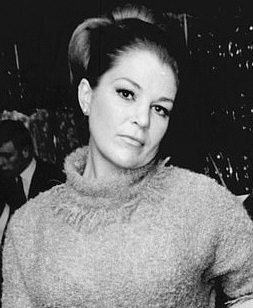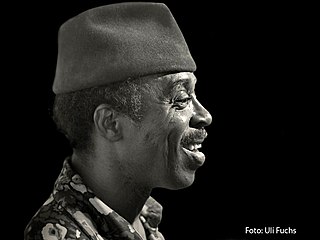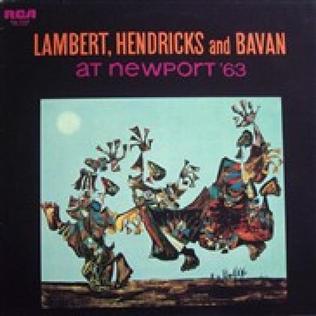Related Research Articles
Vocalese is a style of jazz singing in which words are added to an instrumental soloist's improvisation.

Annabelle McCauley Allan Short, known professionally as Annie Ross, was a British-American singer and actress, best known as a member of the jazz vocal trio Lambert, Hendricks & Ross.

John Carl Hendricks, known professionally as Jon Hendricks, was an American jazz lyricist and singer. He is one of the originators of vocalese, which adds lyrics to existing instrumental songs and replaces many instruments with vocalists, such as the big-band arrangements of Duke Ellington and Count Basie. He is considered one of the best practitioners of scat singing, which involves vocal jazz soloing. Jazz critic and historian Leonard Feather called him the "Poet Laureate of Jazz", while Time dubbed him the "James Joyce of Jive". Al Jarreau called him "pound-for-pound the best jazz singer on the planet—maybe that's ever been".
King Pleasure was an American jazz vocalist and an early master of vocalese, where a singer sings words to a well-known instrumental solo.
Lambert, Hendricks & Ross were an American vocalese trio formed by jazz vocalists Dave Lambert, Jon Hendricks and Annie Ross. From 1962 to 1964, Ross was replaced by vocalist Yolande Bavan.

Peter Scott Ivers was an American musician, singer, songwriter, and television personality. He was the host of the experimental music television show New Wave Theatre. Despite Ivers never having achieved mainstream success, biographer Josh Frank has described him as being connected by "a second degree to every major pop culture event of the last 30 years."

The Hottest New Group in Jazz, also known by its full title Lambert, Hendricks, & Ross!: "The Hottest New Group in Jazz" or alternatively considered self-titled, is the fourth album by Lambert, Hendricks & Ross, released in 1960. The title is a quote from Downbeat magazine. The CD reissue combines the full original album with the group's two other Columbia albums: the 1961 LP Lambert, Hendricks & Ross Sing Ellington and the 1962 LP High Flying. The CD release additionally includes seven previously unreleased "rarities", recorded in 1962. On all these recordings, the group is backed up by the Ike Isaacs Trio.

Stuart Victor Martin was an American jazz drummer.

The Real Ambassadors is a jazz musical developed in the late 1950s and early 1960s by Dave and Iola Brubeck, in collaboration with Louis Armstrong and his band. It addressed the Civil Rights Movement, the music business, America's place in the world during the Cold War, the nature of God, and a number of other themes. It was set in a fictional African nation called Talgalla, and its central character was based on Armstrong and his time as a jazz ambassador. It was the first major large scale musical collaboration between Dave and Iola Brubeck and served as a template for their future musical collaborations. Songs from the musical were recorded by Columbia Records and a soundtrack album was released in 1962, just before the show's premiere at the 1962 Monterey Jazz Festival with an all star cast.

Norwood "Pony" Poindexter was an American jazz saxophonist.
Hermenengildo "Gildo" Mahones was an American jazz pianist.
George Andrew Tucker was an American jazz double-bassist.

Havin' a Ball at the Village Gate is the last album by the reformed jazz vocal group Lambert, Hendricks & Bavan, of Dave Lambert and Jon Hendricks with Yolande Bavan. The group was formed after Annie Ross left the vocal group in 1962. The album was recorded live at the Village Gate club in New York City on December 20 and 21, 1963.
Melissa Morgan is an American jazz singer.
"Mr. P.C." is a twelve-bar jazz piece in minor blues form, composed by John Coltrane in 1959. The song is named in tribute to the bass player Paul Chambers, who had accompanied Coltrane for years. It first appeared on the album Giant Steps where it was played with a fast swing feel.
"Four" is a 1954 jazz standard. It was first recorded and arranged in 1954 by jazz trumpeter Miles Davis and released on his album Miles Davis Quartet. It is a 32-bar ABAC form.
"Hi-Fly" is one of the best known compositions by pianist Randy Weston, written in the 1950s and inspired by his experience of being 6 feet 8 inches tall, "and how the ground looks different to you than everybody else". Since first being recorded on 1958's New Faces at Newport, "Hi-Fly" appears on several other albums by Weston, including Live at the Five Spot (1959), Niles Littlebig (1969), Tanjah (1973), Perspective, Rhythms and Sounds (1978), Earth Birth (1995), Zep Tepi (2005), and The Storyteller (2009).

At Newport '63 is an album by the jazz vocalese group Lambert, Hendricks & Bavan recorded at the 1963 Newport Jazz Festival. The album features the group who had re-formed in 1963 featuring Dave Lambert and Jon Hendricks, with Yolande Bavan replacing Annie Ross who had left the group in 1962.

Recorded "Live" at Basin Street East is an album by the jazz vocalese group Lambert, Hendricks & Bavan recorded at the New York City nightclub Basin Street East. The album features the group who had re-formed in 1963 featuring Dave Lambert and Jon Hendricks, with Yolande Bavan replacing Annie Ross who had left the group in 1962.
"Doodlin'" is a composition by Horace Silver. The original version, by Silver's quintet, was recorded on November 13, 1954. It was soon covered by other musicians, including with lyrics added by Jon Hendricks. It has become a jazz standard.
References
- 1 2 Yanow, Scott (2000). Bebop. Backbeat Books. p. 301. ISBN 978-0879306083.
- ↑ Keepnews, Peter (2017-11-22). "Jon Hendricks, 96, Who Brought a New Dimension to Jazz Singing, Dies". The New York Times. ISSN 0362-4331 . Retrieved 2019-01-21.
- ↑ Fordham, John (2017-11-27). "Jon Hendricks obituary". The Guardian. ISSN 0261-3077 . Retrieved 2019-01-21.
- ↑ Unterberger, Richie. "Knight of the Blue Communion". AllMusic. Retrieved 2018-05-24.